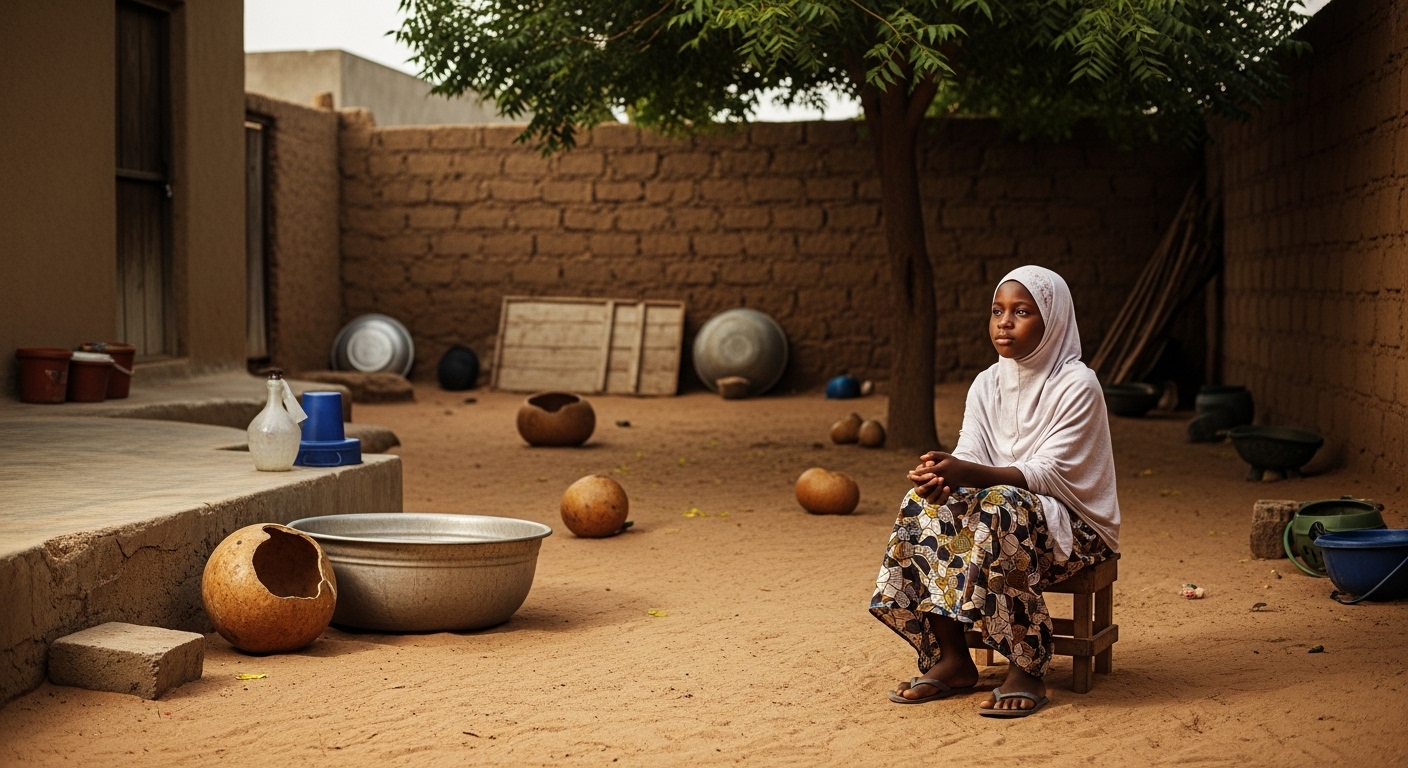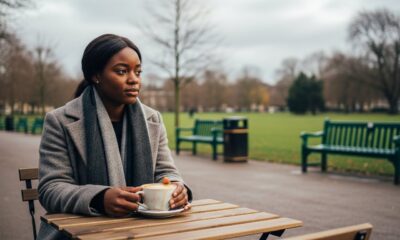Features
BN Prose: Her Name Is Binta by Raheemat Olaore

My dad was transferred from Lagos State to his company’s new branch in the North. It was around that time that my parents got a divorce. My mom only took the custody of my elder sister and youngest brother, leaving my elder brother and me with my dad.
Because there was no one to leave us with, my elder brother and I had to follow my dad.
“Think of this as a new leaf. We are starting all over again. Just us! Isn’t that a good thing?” My dad said in a chirpy tone on the bus up north.
“Start over? Out of all places, in a place like Maiduguri?” I pouted, folding my hands. The clouds were gathering and growing darker as we passed a large green field with windmills spanning across the land. The scent of wet earth from the drizzle filled my nose.
“What? What’s wrong with Maiduguri? Is it not a place too?” My dad asked.
“It’s so far from civilisation! We should have stayed with Mommy!” I complained.
Haneef, my elder brother, nudged me. My dad’s face saddened as he sank into his chair. My scruples itched, and guilt crawled into me.
“I’m sorry,” I said quietly.
“It’s okay,” he replied, sitting up and forcing a smile. “I know you miss your mom…”
“I don’t miss her! She left me! She left us!”
I had always considered myself my mom’s favourite. I could not believe she didn’t choose me.
My dad held my hands. “Your mom loves—”
“Daddy, I want to sleep,” I interrupted him, a sting in my eyes.
“Oh, okay. Here, sleep, love.” He pulled a throw blanket from his holdall and wrapped me.
“Sleepyhead!” Haneef sneered, and I stuck my tongue out at him.
We arrived in Maiduguri to the call of the Fajr prayer. The morning mist was falling, and I was still groggy from sleep. The journey took almost twenty-four hours.
The driver parked the bus and came around to help us offload our luggage.
“Barka da zuwa!” I heard my paternal grandmother’s high-pitched voice before she shone her torch at us.
I had only seen her face through video calls and heard her voice on the phone. Her voice sounded fairly like my dad’s, and her face seemed gentler than in the video calls.
“Mama, ina kwana? Good morning,” my dad greeted her.
“Lafiya lau? Ah! Ah! Ah! Sweet girl! Salimat?” She hugged me, turning away from my dad as she patted Haneef on the back. She smelled of fragrant incense sticks, which was oddly comforting. She often sent a large batch of incense sticks to Lagos, and my mom would light them around the house.
“Esther, taimaka musu ɗaukar kaya,” my grandmother told the lady who followed her as she bent down to help us with our luggage. We trekked to my grandmother’s house on the second street.
Her gardener greeted us at the gate and helped carry what my dad was holding.
In the days that followed, we settled in. We ate morning, afternoon and night, all delicious dishes by my grandmother. When I couldn’t eat some Hausa food like miyan geda, masa, or dan wanke, they would laugh at me for being a thorough Lagosian.
In the evenings, the men would gather in the small living room to watch football, while the ladies watched Africa Magic Channels in the inner living room.
In the mornings, Grandma only asked that I feed her chicks and do nothing else. But sometimes I stayed in the kitchen with Sister Esther, my grandmother’s distant relative who lived with her. She had been displaced after terrorists attacked her home and family in Jos before she came to seek refuge with Grandma. Sister Esther said there were two, but her other sister was in university two states away. She chose to learn tailoring at a neighbour’s house, where she went from morning to evening.
After a week, I was already settled in. My dad had started work, and my elder brother followed the gardener to my grandmother’s farm behind the house. A few times, I was tempted to call my mom to hear her soothing voice, to have her tell me she’d come for me, but I always pushed the thought away. She never called or checked up on us. When my dad called my other siblings, she was always busy. She didn’t deserve to be missed.
Eventually, my elder brother and I got enrolled in a high school four streets away.
*
On my first day at school, I felt lost and alone. The Hausa language and other indigenous tongues of Maiduguri swirled around me. As a Hausa girl by birth, I knew little of my father’s language. However, during classes, English was spoken, which relieved me.
“Hello, new girl,” I heard a voice as I sat on the swing under the baobab tree.
“I’m Binta!” she said, a wide grin across her face.
I didn’t return the smile. I looked away instead and sighed. I missed my friends in Lagos. I played with the pebbles on the sand before reluctantly turning back to her. “Thank you.”
She shrugged, that smile still plastered on her face. She was very fair in complexion and had a round face, her chubby cheeks puffing when she smiled, her white teeth always on display.
“You don’t like it here,” she finally said.
“Huhn?”
“The teacher said you’re from Lagos. How is Lagos? Very big?”
A small smile spread across my lips. “Well, Borno is way bigger than Lagos. Lagos is the largest city in Nigeria, the most populous urban area on the African continent. It’s where everything happens, not like this rural place!” I pouted.
“Ouch!” Binta gasped. “We may not be as developed as your Lagos, but I promise you, Borno is a beautiful place, especially Maiduguri. Give it a chance. You’ll love it here!”
“I doubt it.”
“I can take you around. We can go sightseeing…”
The bell rang, and the lunch break was over.
I stood up to leave.
“Okay, let’s have a deal.”
“A deal?” I repeated.
“Yes! For everything you see, you must learn the name every day. In thirty days, we’ll come back to this discussion. What do you say?” She had a slight accent.
I shrugged. “Whatever.”
She kept hounding me, wanting to know my favourites, my likes and dislikes. She asked what I saw each day and taught me the names in both Hausa and Kanuri.
Slowly, I began to look forward to the next day, to learning something new. Slowly, we became friends. She was the brightest, always ready to answer questions in class, always smiling. She once said she wanted to become a doctor one day. She’d build a hospital in her community and treat people for free. It sounded nice and made her happy, so I never burst her bubble by telling her she couldn’t just treat people for free, that she’d need money eventually, or so I heard my brother say about one of his friends in Lagos with the same dream.
It took weeks of friendship to find out there was no school in her village. She had to come to ours, three miles away, and she was always punctual, unlike me, who was usually late.
Binta had dreams, hopes and goals. She was eager to learn and would light up any room. I grew accustomed to her company. She was a genius at maths, so after school, we’d go to my house, and she’d tutor me.
Sometimes, she’d hesitate to leave, a glint of reluctance when I saw her off. Before we met, she had never seen a flat-screen TV. Standing before our 65-inch 4K smart TV, her mouth fell open.
“I’m going to be successful and buy a TV like this!” She said.
“It won’t be in trend then,” I replied.
“Then I’ll buy what’s in trend.”
I rolled my eyes. “Whatever.”
*
The first time Binta didn’t come to school was suspicious. The teacher said she was sick, and I was worried. The second day, I asked a boy from her village to take me to her house, but he said he had no idea where she lived, which was strange because I was sure I’d once heard Binta say his grandmother was her hairdresser.
Five days passed, and there was no sign of Binta.
I told my grandma, and she said Binta was probably very sick. “Collect her address from the teacher so we can visit her together.” But the teacher said she couldn’t give me the address.
Exam week came, and Binta missed that, too. Binta might forget her name, but she would never miss exams. My heart skipped at the terrible thoughts that visited me.
*
One lunch break, Binta had asked me, “Do you know a group of owls is called a parliament?”
We were under the baobab tree, I was on the swing, and she was gently pushing it.
“Yes,” I said.
She sniffled and swatted a fly. “Why don’t skeletons fight each other?”
I turned to give her a what-the-hell look.
“They don’t have the guts,” she said, laughing.
I rolled my eyes. “Please tell me you’re not laughing at your own joke.”
She shrugged, then pointed upward. “See, a rainbow!” She said, clapping.
“Yeah, it’s beautiful,” I said.
“Don’t be a spoilsport. Learn to appreciate the beauty in life,” she said.
“Yes, yes,” I yawned.
*
A few days before resumption, my Grandma and I stood before a butcher at the market while she haggled. I wished she’d hurry up; my favourite Nickelodeon show was about to start in less than an hour.
Two people came to stand beside me. I barely paid attention until Grandma turned, and she froze.
I followed her gaze.
Binta stood there, dark circles under her eyes, her lips parched, and her glow depleted.
“Binta!” I yelled and threw my arms around her. “How are you? You missed exams! I missed you! The teacher said you were sick. Are you okay now?” I bombarded her with questions.
She only shook her head. “I’m fine, thank you.”
She smiled faintly. Then she stepped back beside the man she came with.
“This is my husband,” she said.
His beard was grey, and he had wrinkles. He said something in Kanuri that I couldn’t understand. My grandmother replied and quickly led me away.
At that time, I couldn’t make sense of it. Wasn’t marriage for adults? I couldn’t sleep. My chest hurt every time I remembered her face. How dark her aura was. How drained out her energy was. I went to Grandma’s room and woke her up.
She turned on her torch and sighed as she gestured for me to sit down beside her.
“Grandma, will Binta come back to school?”
She shook her head. “I don’t think so.”
“But she wants to be a doctor. She wants to help people. She was so sad today, Grandma. Binta was never sad.”
She said nothing and just hugged me. That was the last time I saw Binta.
One night, I had a dream. We were both in a mansion. She was wearing a stethoscope around her neck and smiling gleefully. She pointed to a large flat-screen TV and said, “See, Salimat, I told you I’d buy the big TV.”
I rolled my eyes.“Whatever.”
Then she laughed and came to hug me.



















